“Until the lion tells his side of the story, the tale of the hunt will always glorify the hunter.” - African Proverb
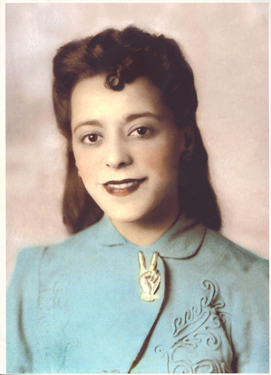
Viola Desmond
Viola Desmond was born in Halifax in 1914. She is remembered for her courageous stand against the segregation laws that existed in Nova Scotia during that time. Desmond was a beautician and a businesswoman who received her training in Montreal and in the United States and returned to Halifax to operate a beauty salon and a beauty school. She also had a line of beauty products. While driving from Halifax to Sydney on a business trip in 1946, Desmond’s car broke down in New Glasgow so she decided to go to a movie because the car would not be ready until the next day. Desmond bought a ticket and seated herself in the “whites only” section of the Roseland movie theatre in New Glasgow. She was told to move to the “coloured only” section and Desmond refused. The police came and forcibly removed her from theatre. Desmond was arrested and put in jail where she spent the night. Never offered the option of bail or even informed of her legal rights, Desmond was eventually found guilty. Viola Desmond’s story and the long drawn out experience with the justice system spread across the country.
Often compared to Rosa Parks, the African American Civil Rights worker, Desmond did not give up and spent a number of years fighting in the courts against a justice system that charged her with tax evasion because there was a difference of 1 cent in tax on the theatre tickets. Desmond found support in many areas during her struggles including the Clarion newspaper publisher and editor, Carrie Best who ran articles supporting Desmond. The Baptist church leaders, led by Pearline and William Oliver and the Nova Scotia Association for the Advancement of Coloured People (NSAACP) and other community activists raised funds to support Desmond with the costs of the criminal trials she would face. Viola Desmond is recognized as one of the leading figures in the fight against segregation laws in Nova Scotia and was granted a posthumous pardon by the provincial government. The Nova Scotia government has declared February 16, 2015 as Heritage Day in Nova Scotia and Viola Desmond will be the first Heritage Day honouree.
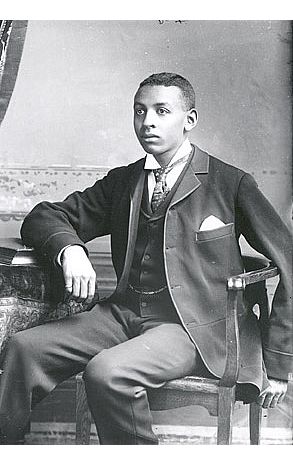
James Robinson Johnston Chair and the Indigenous Black & Mi’kmaq Initiative.
James Robinson Johnston (b: 1876-d: 1915) was the first Black Nova Scotian to graduate with a law degree. In 1991, the James Robinson Chair in Black Canadian Studies was established by his alma mater, Dalhousie University.
Many of the positive changes that occurred in the Black community in the early 1900’s can be attributed to Johnston’s involvement with various organizations, including the African United Baptist Association, the Wilberforce Lodge and the Nova Scotia Home for Coloured Children. Johnston was a strong advocate for education and justice and urged citizens to become involved in local politics. The James Robinson Johnston Chair honours the historical presence and experiences of African Nova Scotians.
The Indigenous Black & Mi’kmaq (IB&M) program at Dalhousie University was established in 1989 as one of the recommendations made by the Donald Marshall Inquiry. It was introduced to address concerns about the lack of representation of people of African and Mi’kmaq ancestry in the Nova Scotia justice system which became evident in 1986 during the inquiry into the wrongful conviction of Donald Marshall. The IB&M program has successfully helped over 155 graduates from law school. This includes notable graduates Burnley “Rocky Jones,” the first African Nova Scotian lawyer to argue and win a case before Supreme Court of Canada and Shawna Hoyte, a successful lawyer in Halifax, and Doctor/Teacher of Law at Dalhousie University.
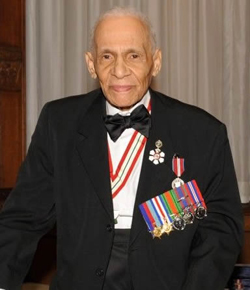
Stanley G. Grizzle, First Black Judge on Canadian Court of Citizenship
Born in Toronto in 1918 Stanley Grizzle dedicated his life to race relation, equality and immigration. At the age of 22 years, Grizzle began working as a railway porter where he soon recognized the need for the Black porters to form a union in order to create better working conditions. He was already involved as a leader in the civil rights campaign and had helped establish the Young Men’s Negro Association in Toronto. Under his leadership, in 1942, three Canadian chapters of the Brotherhood of Sleeping Car Porters were formed. Working tirelessly on efforts to combat racial intolerance, so widespread in Canada at that time, Grizzle and others lobbied the provincial and federal governments of the day to enter into discussions about fairer immigration laws and to bring in anti-discrimination legislation. Grizzle was appointed by Prime Pierre Trudeau to the Canadian Court of Citizenship in 1978. He was the first person of African ancestry to have this honour. Judge Stanley G. Grizzle was awarded the Order of Ontario in 1990 in recognition for his years of services in race relations and human rights.
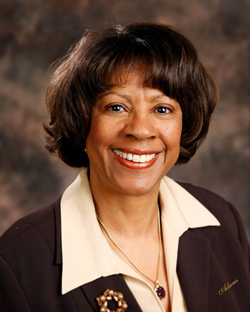
Judge Corrine Sparks
Corrine Sparks is the first African Nova Scotian to be appointed to the judiciary and first African Canadian female to serve on the bench. Sparks, from Lake Loon-Cherry Brook, is one of 9 children born to Spencer and Helen Sparks. She attended Mount Saint Vincent University and Dalhousie Law School, graduating in 1979. Her graduate thesis focused on the legal issues of compensation and relocation of the residents of Africville. Sparks practiced private law from 1979 and in 1986, she was appointed a judge to the family court. A strong advocate for equal rights and education, Judge Sparks is well-respected amongst her peers and in her community where she holds positions on advisory boards and organizations. She is a well-known lecturer throughout the world teaching with the Commonwealth Judicial Education Institute.
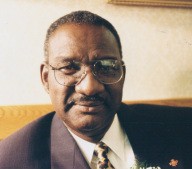
Judge Castor Williams
Castor Williams was the second person of African ancestry to be appointed to the judiciary in 1996. Born in Antigua, Williams received a B.A. in Political Science and Economics and in 1976 a law degree from Dalhousie University. He practiced law independently until 1992 when he was appointed crown attorney in Dartmouth. Williams is active in his community and is a founding member of the Joint Consultative Committee (JCC), which brings together major organizations with a view to community economic development. He was the chairperson of the Black Learners Advisory Committee (BLAC Report) and a past president of the Black Lawyers Association of Nova Scotia. Judge Williams is currently a Provincial Court Judge in Halifax, Nova Scotia.
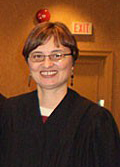
Judge Jean Whalen
Jean Whalen was the third person of African ancestry to be appointed to the judiciary in Nova Scotia. She was born and raised in Dartmouth, Nova Scotia with strong family ties to the Black community of Whitney Pier in Sydney, Nova Scotia. A 1984 graduate of Dalhousie University Law School, Judge Whalen was called to the bench of the Provincial and Family Court in 2009 after working as a Crown Attorney with Public Prosecution Service for 20 years. Whalen is a founding member of the Black Lawyers Association and Vice-Chair of the Race Relations Committee of the Barristers Association. Active in the community, Judge Whalen volunteers with several organizations including the African United Baptist Association and the Community YMCA and currently serves as Provincial/ Family Judge in Sydney, Nova Scotia.
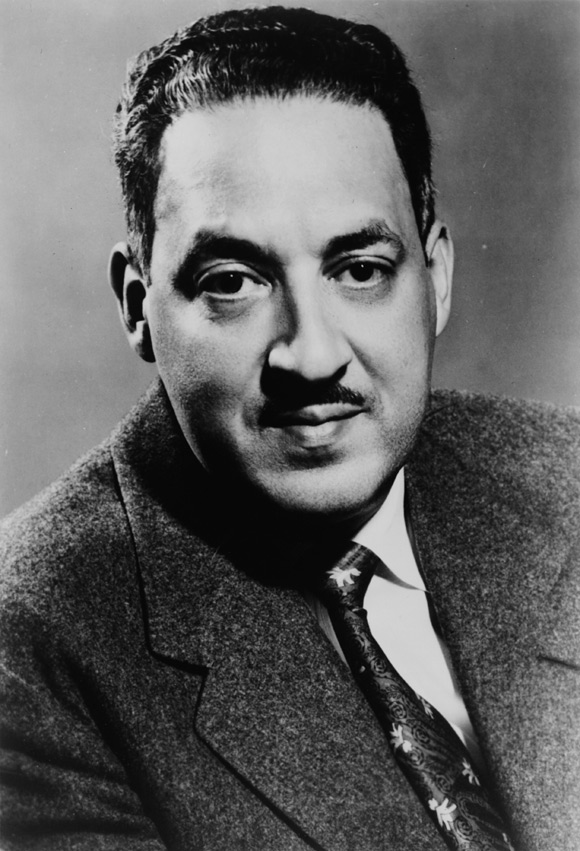
Brown vs. Board of Education (1954) -- Thurgood Marshall
Brown v. Board of Education was a legal court case that included 5 different lawsuits brought before the United States Supreme Court in the early 1950s calling for an end to racially segregated schools in the United States. Thurgood Marshall, an African American lawyer and the NAACP (National Association for the Advancement of Coloured People) led the fight inside and outside the court room in this historic case. Marshall’s argument centered on the fact the separate school system for Blacks and Whites was unequal, discriminatory and most importantly went against the equal protection clause contained in the United States Constitution. He also argued that psychologically and sociologically segregated schools could make black children feel inferior to white children and that this system should not be legally enforced.
As the Supreme Court debated the case it began clear that the Judges were divided over whether to desegregate schools. Finally, in May 1954 the United Stated Supreme Court reached a decision that separate but equal schools had no place in the United States. The ruling declared segregation in the public school system unconstitutional and that all public schools throughout the country would be integrated. This landmark case helped lay the groundwork for the Civil Rights Movement of the 1960’s. In 1957, Thurgood Marshall would become the first African American to be appointed to the United States Supreme Court.
Continue reading: Week Two African Heritage Month Narratives
